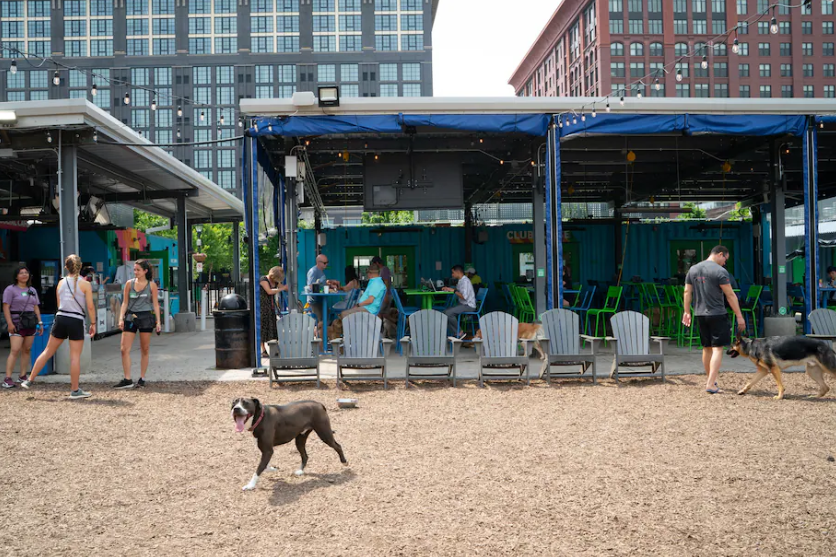Developers are adding outdoor co-working space — bocce ball, anyone? — to attract remote workers to stores and restaurants
While central business districts like downtown Washington continue to struggle as more than half of office workers stay away, many suburbs have rebounded by courting suburbanites who have settled in after more than two years of mostly working from home.
Losing the commute has left many with an extra 30 minutes to three hours a day to eat out, shop and relax closer to home, along with more money saved on gas, parking and transit fare. As many suburbanites happily cling to the flexibility of telework, developers say, some also are craving company and a change of scenery. Others want to avoid the office but seek refuge from distracting children or WiFi-hogging roommates.
Suburban developers and retailers are working to provide ways to escape home, be around others, and, most importantly, spend newfound time and money.
“If they’re working from home Tuesdays and Thursdays, they’ll spend [nearby] when before, they spent that money near their work,” said Sebastien Aubouin, research director for McLean-based Rappaport.
They are new customers like Shannon Strang, who uses lunch breaks from her IT consulting job to walk and play with her rambunctious 1-year-old pandemic pup, Max. Strang said she moved to the Mosaic District shopping and restaurant development in Fairfax County from a Falls Church high-rise for a more fun place to work from home full-time.
She said she cooks more or grabs a bite from the Chipotle or Panera down the street from her apartment — time and money she used to spend getting to, and buying lunch near, her office in Tysons.
“I can spend more time working or with free time rather than being stuck in traffic three hours a day,” said Strang, 42. “I hang out here a lot.”
Neighborhood retailers are eyeing the money she and others are saving on the commute, in addition to the thousands of dollars that office workers typically spend annually in restaurants, bars, clothing stores, entertainment venues and other businesses. In many cases, coffee breaks, haircuts and happy hours that used to happen near downtown offices have moved to the suburbs.
“Downtown Bethesda has thrived while downtown D.C. has really struggled,” said McLean Quinn, CEO of Bethesda-based developer EYA. “That contrast has to be a function of the population shifting its presence.”
In the Washington region and nationally, the trend is most striking in higher-income inner suburbs, where more residents have computer-centric jobs suited to remote work and money to spare.
Hailey Quigley, a consultant, and Rory Shinnick, a graphic designer, said they’ve been meeting most days for the past year to work together on their laptops at the Mosaic District — outdoors in good weather and in a coffee shop when it’s rainy or cold.
They buy coffee and breakfast most mornings and sometimes lunch — costs they said they’re willing to pay to work around and bounce ideas off a close friend while creating some separation between work and home. Quigley, 26, said she appreciates skipping the commute from Reston to her Rosslyn office and saving $16 each day on parking.



